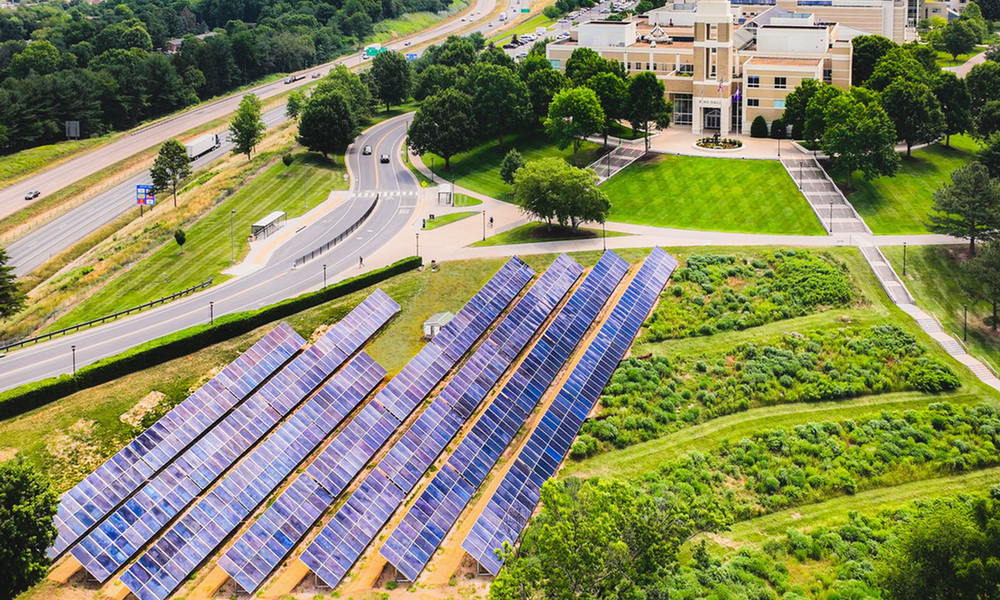JMU is the first university in the state to earn a Virginia Pollinator-Smart Certification
Environmental Stewardship
SUMMARY: James Madison University is the first university in the state to earn a Virginia Pollinator-Smart Program Certification. The East Campus Hillside, located below King Hall, features the expanded solar array and native pollinator habitat that were included in the certification.
James Madison University is the first university in the state to earn a Virginia Pollinator-Smart Program Certification. The East Campus Hillside, located below King Hall, features the expanded solar array and native pollinator habitat that were included in the certification.
The Virginia Pollinator-Smart Program, designed by the Virginia Department of Conservation and Recreation and the Department of Environmental Quality, is an “ecologically-responsible program to encourage pollinator-friendly solar energy developments throughout the Commonwealth of Virginia.” Through rigorous certification standards, the program’s review board has deemed the JMU Solar-Pollinator Meadow and Solar Array to meet the performance standards of the relatively new program.
In early 2022, the previous 10-killowatt solar array on the East Campus Hillside was replaced by an expanded, modern 310-killowatt solar array. This expansion was funded in part by the Virginia Department of Energy after being recommended by the JMU Clean Energy Working Group. Some meadow around the old array was removed and other meadow areas were disturbed by the construction activity. A new meadow was planted between the panels and around the area to achieve shorter plant heights that would not shade the solar panels. Native species suggested by faculty were planted along with shade tolerant plants that were particularly beneficial to pollinators as listed on the Solar Site Native Plant Finder tool on the Pollinator-Smart website. Bird houses, native bee-nest shelters, and educational signs were installed on the fence surrounding the array. A vegetation management plan was developed and submitted. The site is now not only fit to provide more solar energy to King Hall on campus, but also to provide a native pollinator habitat with the goal of establishing a long-term, environmentally sustainable, and educational landscape.
Going forward, the East Campus Hillside, including the Pollinator-Smart Meadow and Solar Array, will continue to act as an outdoor learning space, a living laboratory on campus where students can learn about solar energy and native pollinators. Students will be able to use three different meadows on the East Campus Hillside: the original Upland Meadow, the Pollinator-Smart Meadow and a new addition in 2023 — the triangle-shaped Steep Slope Meadow.
JMU’s first president, Julian Burruss, once said “it is obvious that the work of the school can no longer be confined to theory and books, but must seek its material in real things, in nature, in the practical activities of industry and commerce.” Ali Sloop, Stormwater Compliance Specialist at JMU, coordinated the application for the Pollinator-Smart certification and remarked, "By expanding this solar array and pollinator meadow, the University has shown that it is committed to developing ways for students to be engaged with the world and its natural resources. This certification acknowledges JMU’s place as innovators, in Virginia and beyond, and shows how the university can lead the way to spread important environmental knowledge to our students and to the wider Harrisonburg community."
The following principles guide JMU’s individual and institutional actions toward more sustainable practices: create an institutional culture of sustainability; foster interdisciplinary research, education, and literacy in sustainability; build sustainable community through partnerships, service, and outreach; and improve environmental quality and conserve natural resources. Partners across the university collaboratively build an environmentally literate community whose members think critically and act, individually and collectively, as model stewards of the natural world. In 2022, JMU earned a silver level rating for its comprehensive sustainability achievements from the Association for the Advancement of Sustainability in Higher Education. The rating is based on a framework — the Sustainability Tracking, Assessment & Rating System — for colleges and universities to measure their sustainability performance every three years. The framework addresses the environmental, social and economic dimensions of sustainability. The university is also consistently listed in The Princeton Review’s Guide to Green Colleges for its environmental efforts and was recognized by The Princeton Review as one of the Top 50 Green Colleges in 2022.
